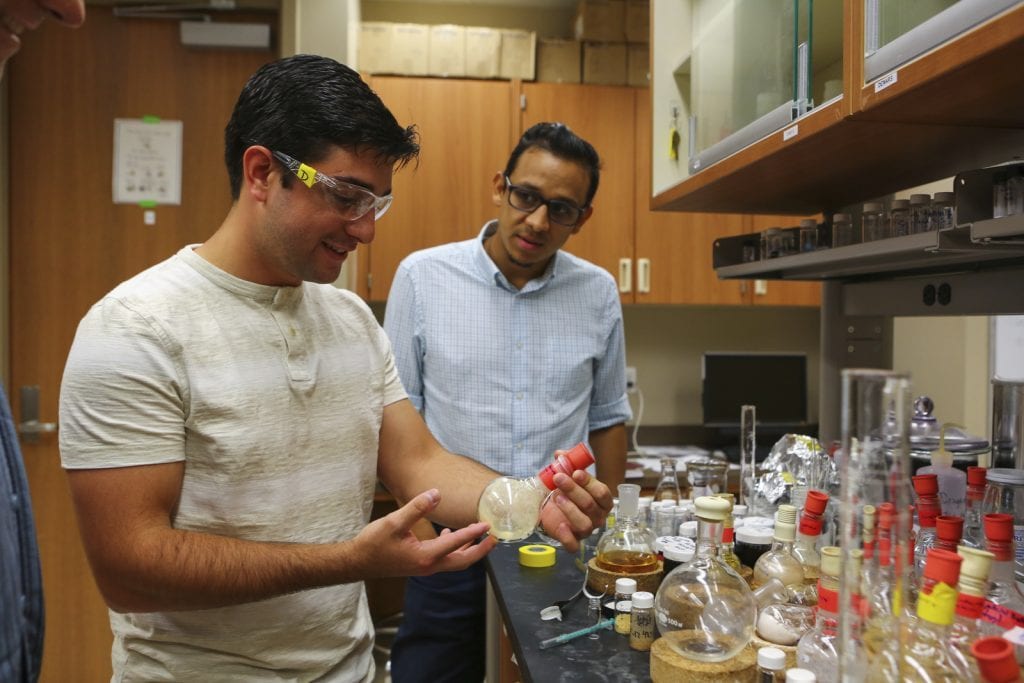College of Sciences Sets New Research Funding Record

Chemistry graduate student Demetrius A. Vazquez-Molina (left) and chemistry professor Fernando Uribe-Romo (right).
The University of Central Florida received a record $183 million in research funding for 2018.
It’s a 23 percent increase from last year and a 37 percent increase from 2015.
Among the many projects that helped propel UCF’s research funding to its highest ever are the management of one of the world’s most powerful fully operational radio telescopes, a state-of-the art PTSD mixed-reality treatment program for the military and first responders and the creation of a Veterans Legacy Program to ensure veterans’ stories are recorded for new generations.
“UCF’s record-high research funding proves that we are on a path to becoming a preeminent university for the 21st century powered by big thinkers and makers whose work has real-world impact,” President Dale Whittaker says. “An institution is only as great as its people, and our commitment to intellectual curiosity and solving today’s toughest challenges has never been greater.”
In 2016, UCF launched its Collective Impact strategic plan that outlined goals for various areas across the university. For the Office of Research, one of the goals is to increase research funding to $250 million by 2020.
“This is a great start,” says Elizabeth Klonoff, vice president for the Office of Research and dean of the College of Graduate Studies. “We are well on our way to our goal of $250 million by 2020. This progress is the result of UCF’s strong faculty and our new faculty hires working together toward a common goal.”
UCF’s research success hasn’t been limited to one specific college or to veteran researchers alone.
The university has encouraged interdisciplinary approaches to big challenges. In 2015, the university launched a faculty cluster initiative that brought together cross-disciplinary teams focused on solving scientific and societal challenges through teaching and research. There are now nine clusters, each steadily working toward success in areas spanning cybersecurity to learning sciences. Just this past year, the Sustainable Coastal Systems cluster led to the formation of a National Center for Integrated Coastal Research, which aims to find sustainable solutions to challenges facing coastal communities.
Grant proposal from the clusters and other interdisciplinary teams resulted in $81.1 million. Another $11.26 million in grant funding came from 66 faculty members who went after grants and were doing so for the first time as principal investigators.
Most colleges are seeing research growth, including the College of Sciences with a 58-percent increase in funding and the College of Arts and Humanities with a 57-percent jump. The College of Engineering and Computer Science, which generated $46 million alone, also saw its funding increase 39 percent.
Among the big new grants that helped make history this year:
- $6.3 million for simulation research pertaining to social media
- $8.3 million for the management of the Arecibo Observatory in Puerto Rico
- $3.7 million for new materials research
- $2.9 million for an innovative PTSD treatment program
- $1.9 million to evaluating counseling effectiveness of diverse married couples and families
Today, faculty and graduate students are conducting a range of research pertaining to suicide, energy, tourism, HIV, cancer, apps and human behavior, civics education, language acquisition, cyber security, sea level rise, building energy conservation, species conservation, crowd counting, sinkholes, and art’s impact on health.
The Office of Research exists to help faculty at UCF get their work done. In the past year, the Office of Research reviewed its operations and then reorganized to better support researchers going after grants. The office made many changes from modifying the timeline for submitting sponsored research proposals to hiring a new associate vice president to oversee the administration of grant and contract operations. The office worked with college leaders and research administrators to select and implement the new workflow and new software that will soon help scientists and research administrators work together more effectively.
Written by Zenadia Kotala
